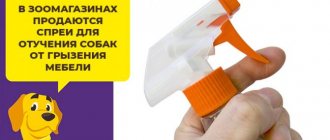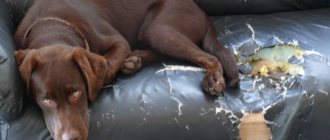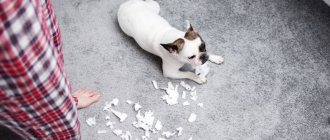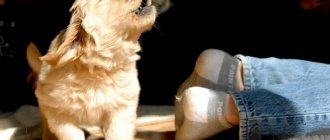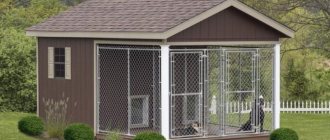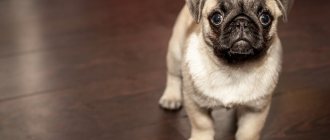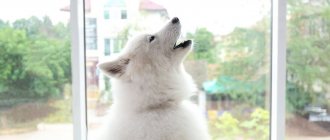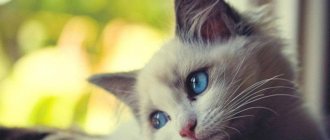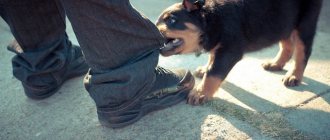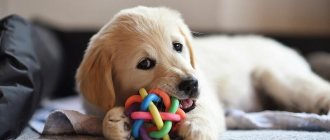Probably every owner has encountered a similar problem sooner or later. Almost every puppy at a certain age begins to try “forbidden” things. For some, the habit goes away with age without intervention from the owner, but for others it develops into a real problem.
Therefore, even before buying a puppy, you need to look for information on how to stop a dog from chewing everything in the house. If the problem has taken a catastrophic turn, then screaming, much less hitting your pet, is absolutely forbidden. First of all, you need to understand why the unwanted habit was formed, and only then begin to correct the behavior. During the training process, it is important not to lose trust and mutual understanding with the dog, act confidently and be patient.
Why is this behavior dangerous?
The fact that a furry comrade is tearing property with his teeth is not only harmful to the family budget. This can also be dangerous for the pet's health. He is quite capable:
- swallow synthetic threads;
- cut gums;
- spoil or break teeth;
- damage the esophagus;
- block the respiratory tract with a swallowed piece;
- receive an electric shock when biting through wires;
- become infected by chewing on shoes the owner wore while walking down the street.
For this reason, even if the owners do not mind things, weaning the dog from chewing is important and necessary.
Useful video on the topic
In this video you will learn how to stop your pet from chewing everything. What tricks and methods exist, and how behavior adjustment differs in puppies and adult dogs.
If a pet chews on everything, then this is not only a blow to the owner’s nerves and the family budget. This behavior can harm the dog itself. A four-legged animal can get an electric shock, be poisoned by wallpaper glue or plant sap, or eat padding polyester, thread, and other “garbage.” And also damage the gums, esophagus and stomach with sharp fragments and splinters. Therefore, even if owners are not sorry for damaged things, they should think about the health of their pet.
Why does a puppy or adult dog chew furniture and things?
More often, the animal tries objects with its teeth for 5 reasons.
Itchy teeth
When a puppy's teeth change from baby teeth to regular ones before six months of age, everything in his mouth itches. There is only one way to reduce discomfort - chew something.
Hunting instinct
Our wet-nosed friends are former wild predators and hunters. From time immemorial, they obtained their own food and tore their prey into pieces with their teeth. When the friend begins to damage furniture and objects, he is guided by his hunting instincts and rips the “caught animal” with his teeth.
Boredom, lack of attention and activity
When a dog is left alone with himself, he has nowhere to put his energy. And in order to occupy himself with at least something, he begins to taste the sofa, the new shoes of the hostess and much more.
Lack of toys
If a “friend of man” does not have something that can be sharpened with impunity, he will occupy his mouth with something else. Therefore, it is very important to purchase for your pet several balls, bones and figurines made of safe materials, on which he can sharpen his teeth.
Downed mode
A disrupted routine is stressful for a four-member family. And he will most likely take it out on objects in the house. The dog must have a clear daily routine: he must go to bed and wake up at the same time, walk and eat at set hours, and know exactly when the owner leaves home and when he will return. If a four-legged dog has an irregular day, he feels that he lives according to an unpredictable schedule and reacts accordingly.
“Anti-gryzin” type products
Chemistry has firmly entered the life of modern man and is actively used in keeping dogs. Now certain chemical compounds have been developed that are absolutely safe for dogs and humans, but can help accustom a pet to a sleeping place, a toilet, or discourage it from encroaching on furniture . The latter are popularly called anti-rodents, but in fact this is only one of the names of a certain remedy. Let's look at the most popular substances that are used to wean a dog from trying to chew something.
There are special means that can prevent such situations
Table. Anti-rodents for dogs.
| Name | Description |
| 8IN1 NM NO-CHEW | This remedy is considered one of the best for correcting dog behavior. It will help wean the animal from chewing everything in the house, not just furniture. Safe, does not irritate the skin and mucous membranes, does not leave stains on furniture. The drug also contains sedatives that will relieve the animal’s anxiety. For dogs, the product tastes bitter, which discourages them from chewing on the sprayed object. |
| TropiClean Stay Away | This substance contains very bitter components, but safe for pets. They help cope with constant gnawing in the house and licking of certain places. You can even spray plants with it, protecting them from being eaten. |
| Mr.Bruno Spray No problems | The spray should be used regularly, spraying furniture approximately once every 3-4 days. Dogs don’t like its taste and smell, and they gradually wean themselves from trying what they don’t need on their teeth. |
| Antigryzin Himola | The most famous spray against damage to furniture and other objects by teeth. Contains substances that smell unpleasant to dogs. Suitable for use during teething in puppies. |
Attention! Anti-rodents often do not live up to expectations, so you shouldn’t place much hope on them.
Pathological causes
Sometimes the love of “chewing” is associated with serious deviations. And there is no way to solve these problems on your own - only together with a veterinarian or other specialists.
Oral problems
It is important to systematically check the animal's mouth. His teeth and gums may hurt, or maybe there is something stuck there? In this case, chewing on objects is the only way to pacify the pain a little.
Stress
Stress in four-legged animals is not an empty word and not nonsense. Stress causes many behavioral problems and even serious illnesses. Therefore, it is important to catch yourself in time and attend a consultation with a zoopsychologist.
Lack of vitamins
Poor nutrition and a poor diet lead to immune disorders and vitamin deficiencies. And the tailed one tries to make up for it from surrounding objects - especially if it is a small puppy.
Psychological abnormalities
Psychological problems in a four-legged animal can result in very serious consequences. Only an animal psychologist will help you find out the causes of the animal’s disorder and tell you how to fix it.
Dogs that don't chew furniture: list of breeds
The love for pranks in general depends not on the breed, but on the temperament, upbringing and personal preferences of the pet. But some dogs, compared to others, cause much less trouble to their owners.
Breeds that are less likely than others to chew on interior and wardrobe items:
- Decorative breeds with a flattened muzzle, such as pugs, Pekingese, French bulldogs. The structure of the jaws and small stature makes it difficult to “spoil” the owner’s things.
- Yorkshire Terrier, Pomeranian Spitz, Bichon Frize, Shih Tzu and Corgi are considered very calm pets that rarely attack household items.
- Large and medium-sized breeds include golden retrievers, collies, Great Danes and poodles.
How to stop a dog from chewing things and furniture
Having dealt with the reasons for destructive behavior, you need to decide how to wean your dog from gnawing anything that doesn’t lie well.
So, what to do if your dog chews furniture and objects.
Education and training
Usually, damage to property is due to the fact that the owners did not teach their younger brother in time that sharpening his teeth on furniture and shoes is bad. People think that their wet-nosed friend should figure out what to do and what not to do, but it doesn't work that way.
It is necessary to raise a pet when it is still small. Do not allow your puppy to ruffle pillows or slippers, as he will continue to do the same thing as an adult, only on a larger scale.
To prevent your dog from chewing things, show him what he can touch and what he cannot. Praise the wet-nose when he plays with his toys, and say “ew” when he approaches the sofa or stool legs with interest.
Distraction
The best way to keep valuables out of the teeth of a wet-nose is to distract him. It is advisable to do this with the help of toys, which should be enough so that your friend does not get bored. Otherwise, they will be replaced by slippers, wires, carpets and chairs.
Products from a pet store
You can use a trick and purchase special products at the pet store that are applied to the surface of objects. They have a repulsive taste and smell for pets.
You can get by with folk remedies if you know what smells are unattractive to dogs. This:
- mustard;
- decoctions of bitter herbs (for example, wormwood);
- vinegar;
- citrus.
However, remember that folk remedies are not safe. Some dogs will sniff, wince and leave. But someone will have a stronger desire to scratch their teeth on a chair leg, and the wet-nose will bite this object, which will provoke poisoning.
Increased activity
Any, even the laziest animal must move. Movement does not mean just a quiet walk, but active games certainly in the fresh air. This is especially important if you go to work and are away from home most of the day. The animal must run and play enough to release all the accumulated energy and get tired.
Order in the house
If before the arrival of your four-legged friend you could easily afford to make a little mess, then the animal will quickly teach you to put back everything that could be spoiled. It is necessary to remove out of sight any objects that could potentially interest a tailed comrade.
Buying toys and treats to chew on
It will be great if you buy a lot of different items. But don't give them to your friend right away - let him play with some of them first. After some time, remove the old toys and give them new ones.
Change them periodically so they don't get boring. Also, various bones and other treats from the pet store will not be superfluous, with which you can not only sharpen your teeth, but also enjoy them.
Close some rooms
It is reasonable to close the entrance to some rooms where the four-legged one especially likes to taste everything or where you have valuable items. If the room does not have a door, install a special fence for the weevil of such a height that it cannot jump over it.
When is specialist help needed?
Sometimes you can’t cope without outside help, and then you have to contact a specialist to solve your problem.
Vet
First of all, contact your veterinarian if you don’t know how to stop your dog from damaging furniture in the house, although you’ve tried a lot of things. Your ward probably has health problems.
Excessive drooling, unpleasant odor and reddened gums can indicate problems with the oral cavity. Systemic disorders of internal organs are detected by lethargy, fluctuations in appetite, unusual bowel movements, vomiting, and shortness of breath. But if everything is in order, then you should go to other specialists.
Dog handler
A dog trainer will help you find a common language with your four-legged dog, teach him commands and train him. It is likely that your friend simply lacks discipline, and a dog trainer will correct this.
Animal psychologist
If the dog trainer didn’t help, then it’s a matter of psychology. The dog could be very frightened of something - or he is stressed. A zoopsychologist will find out all this and give advice on how to behave with your pet and help him.
Rule 1: Attach the old leash
It sounds strange to new dog owners, but then they try it and realize that it solves literally 90 percent of your problems. It's simple.
You need to take an old leash that you no longer use, cut off the handle (so it doesn't snag), attach it to your dog's collar and let him drag it around.
Why do this?
It's basically like a remote control for your dog. You no longer need to catch your dog, you no longer need to chase him to take something away, he can no longer run away, hide and chew something.
Now do you understand why I put this rule first?
Tricks and life hacks
Use useful tips in practice to protect both your property and the health of your four-legged family member.
Offer your pet an alternative. If you see that he is encroaching on the chair, immediately say “ugh” and give him a bone or toy. This way, the four-legged dog will understand that if he wants to sharpen his teeth, then a chair is not the best option.
Remove any valuables from sight. So, expensive shoes should be stored in boxes and put on the top shelves. Close the cabinet doors tightly or buy special plugs that are used to protect them from children.
Some owners lock the animal in a separate room or playpen. It is very important that the playpen or cage is spacious. The pet should stretch out to its full height in it and not remain locked up for a long time. Be sure to provide your animal with toys that will distract him from boredom.
Agree with family members to put their personal belongings away. Also decide how you will raise your tailed friend, what methods of punishment you will use so that your household acts according to the same scenario. This way he will learn faster.
Don't let your pet bite you or other people. Scream out supposedly in pain, even if you were not hurt. If he continues to bite, ignore him, turn away, don't talk to him. Over time, he will understand that you generally disapprove of biting.
If your tailed companion has taken a liking to some specific furniture in the house, for example, chair legs, wrap them in a rag or block access to them in another way.
When you need to leave the house, leave the radio or TV on. Background sound creates a sense of presence for your pet and eliminates the oppressive silence. The dog will not feel lonely and will not spoil everything in the house.
Does your ward not pay attention to toys? You can spread them with something tasty and aromatic. This will certainly pique the four-legged dog’s interest.
Please note that it is easier to wean puppies through play and distraction, while it is easier to wean a teenager or adult dog through a ban.
Common mistakes owners make
Many owners, out of ignorance, make mistakes in raising a four-legged dog. Here are the ones that are especially common:
- The owner punishes his ward for damaged boots or torn wallpaper several hours after the offense. The fact is that punishment should follow immediately after the unwanted action, so that the dog can form a puzzle and realize that this cannot be done. Otherwise, he simply will not understand why exactly he is being punished.
- Another extreme is not to punish at all. Let’s say your pet tore apart his slippers, which would still have to be thrown away. But this does not mean that you should forgive the dog for this action. Today these are unnecessary slippers, and tomorrow - expensive leather boots or important documents. The animal must understand that damaging the property of its owners is unacceptable.
- In continuation of the previous point, do not let your dog play with old shoes that you have not worn for a long time. The wet-nose must have his own special toys. Otherwise, having played with old shoes, he will decide that he can put his teeth into new ones.
- The most unforgivable mistake is physical punishment of a living creature. You will not achieve anything good, but you will awaken fear, resentment or even aggression in him. After a couple of blows, he may stop damaging the furniture, but instead of a friendly and affectionate pet, you will get a morally depressed and psychologically crippled animal that will do dirty tricks worse than damaged furniture.
Remember: it is useless to stop a puppy from chewing objects! It is physiologically necessary for a puppy to sharpen his teeth, because his new fangs are erupting. Many owners make a huge mistake by not buying their baby “chews”, which are extremely necessary at a certain age.
What not to do
- Never scold or hit your dog if the furniture or shoes are already damaged. She may not associate the punishment with damage to property, even if she committed a mischief a couple of minutes ago.
- Don't cover your dog's mouth with tape. This is inhumane, inhumane, will do no good, and the pet may die.
- Do not use a muzzle to prevent chewing. It is needed for other purposes.
- Do not use red pepper as a substitute for rodent control. The spice can ruin a dog’s sense of smell and burn the mucous membranes of the mouth and nose. If red pepper gets into your eyes, it can damage your vision.

